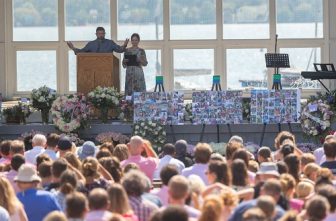A number of years ago the Minneapolis paper carried a weekly feature in the religion section called “The Seeker.” Each week the reporter would attend a different church, synagogue, mosque or temple and report on the experience. One of the questions always addressed was how each congregation welcomed visitors. While, I imagine, most congregations think of themselves as welcoming communities, the practices of hospitality can vary greatly from one to the other.
There are many ways to welcome. For example, one can welcome people over for dinner by cleaning up the house and getting everything in order to look nice for a nice dinner and nice conversation. At the end of the evening when they leave, we can say, “Whew! That was nice, but I’m glad it’s over.”
There is the way that parents welcome a newborn child into their lives. They rearrange their house, their schedule, and, in the case of a birthing mother, their body, to welcome this child into their life.
I’m also reminded of the many people who have traveled on an overseas mission trip and were overwhelmed by the hospitality of their hosts who have so little.
Even if they don’t speak the same language, this act of hospitality communicates something beyond words that changes them. After the visit, many admit, “I thought I was a welcoming person until I came here.”
I think the Christmas season we just celebrated reveals God’s hospitality. From Mary’s annunciation and visitation to the nativity and epiphany, the stories of Christmas have to do with visiting and welcoming and going on new paths. In each case, the people were transformed to the degree that they were willing to welcome Christ into their life, their relationships and their destiny.
God welcomes humanity by entering the human condition. God welcomes the poor, the marginal and the stranger by living in solidarity with their state in the world. The incarnation is the most affirming doctrine of human life and dignity that we have. As St. Ireneaus said, “The glory of God is man fully alive.” If we could receive this gift, I can imagine no reason for war, for hate, for marginalizing and dismissing one another.
And yet, as I write this, I’m aware that in so many ways we have not welcomed this gift. Schools in Minnesota are on lock-down today because of threats to the safety of students. We live with the aftermath of mass shootings and the massive arming of people. We read about the violence toward women and girls in Asia and the sex trafficking of girls here in our community and many others.
We can see the diminishment of respect for human dignity from the womb to the tomb. Sometimes, we are just too busy and distracted to notice. Somehow, for me, it betrays a lack of hospitality for human life that God offers. We need to pray for our own epiphany of human life.
I’m reminded of such a story told by Thomas Merton, a well-known Trappist monk, in which he recounts an epiphany of God’s presence he had at the intersection of 4th and Walnut Streets in Louisville, Ky., on March 18, 1959. He said, “I was suddenly overwhelmed with the realization that I loved all those people. . . . I have the immense joy of being (hu)man, a member of a race in which God Himself became incarnate. If only everybody could realize this! But it cannot be explained. There is no way of telling people that they are all walking around shining like the sun.”
As we enter the New Year, let us pray that we may be touched by the spirit of God’s hospitality for human life. May we realize the gift and the glory of being human. May we be ambassadors of life in our relationships, our labors and our consumption of the world’s goods. We can pray for further epiphanies of God’s impartiality toward the human race.
We can pray with more fervor before communion at Mass, “Lord, I am not worthy for you to enter under my roof. But, only say the word, and my soul shall be healed.”
Deacon Mickey Friesen is director of the archdiocesan Center for Mission.



